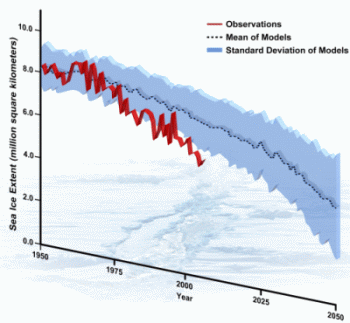"Climate Change is Not Urgent, it's an International Emergency"
 Two days ago yet another study surfaced that highlights the immense size of climate change problem the world faces today. New observations from the field find that Arctic ice sheet is melting at a pace 30 years in advance of what the computer models predict. The blue area in the graph shows the range of melting predicted by the models used in the Intergovernmental Panel on Climate Change (IPCC) reports. The actual melting shown by the red line is decades ahead of the prediction.
Two days ago yet another study surfaced that highlights the immense size of climate change problem the world faces today. New observations from the field find that Arctic ice sheet is melting at a pace 30 years in advance of what the computer models predict. The blue area in the graph shows the range of melting predicted by the models used in the Intergovernmental Panel on Climate Change (IPCC) reports. The actual melting shown by the red line is decades ahead of the prediction. This could mean that sea-level worldwide could rise at a pace no one expected. When the IPCC reports came out, they shocked the world. Now it turns out, IPCC assessments are too conservative. This is hardly surprising to those of us who have been following this issue closely. IPCC works on a consensus-building approach - every government representative must agree with the scientists, and they have an early cut-off period after which they can't consider any new scientific evidence. Now BBC writes that this is the third time in past few months that new studies have shown IPCC reports to be too conservative.
It's well known that most of the countries in the world have yet to act on climate change. America and Australia, two of the largest per capita polluters have no targets to curb carbon emissions. Africa, which has probably the most to lose by changing climate, is too mired in its own problems to pay attention. Asia, particularly China and India, is content playing the blame game with the developed world, which has responded likewise. The issue is particularly bad in India because we are the only country in the world where there is least awareness about climate change, according to a recent Gallup poll.
However, even a few countries in Europe that are genuinely concerned about the issue and have addressed it with targets appear to be doing far short of what is necessary. George Monbiot's latest column in Guardian does an excellent job of making the complex clear about the relationship between government targets of greenhouse gases in the atmosphere and rising global temperature. Here is a ten-point summary of Monbiot's article using original quotes:
- Any level of climate change is dangerous for someone, but there is a broad consensus about what this word means: two degrees [celcius] of warming above pre-industrial levels. This aim has been adopted overtly by the UN and the European Union, and implicitly by the British, German and Swedish governments.
- The average global temperature is affected by the concentration of greenhouse gases in the atmosphere [...] usually expressed as "carbon dioxide equivalent".
- A paper published last year [...] suggests that if greenhouse gases reach a concentration of 550 parts per million, carbon dioxide equivalent, there is an average of 82% chance that global warming will exceed two degrees. Only if concentrations are stabilised at 400 parts or below is there a low chance (an average of 28%) that temperatures will rise by more than two degrees.
- You begin to understand the scale of the challenge when you discover that the current level of greenhouse gases in the atmosphere (using the IPCC's formula) is 459ppm. We have already exceeded the safe level.
- To give ourselves a high chance of preventing dangerous climate change, we will need a programme so drastic that greenhouse gases in the atmosphere end up below the current concentrations.
- But no government has set itself this task. The European Union and the Swedish government have established the world's most stringent target. It is 550ppm, which gives us a near certainty of an extra 2C.
- The British government makes use of a clever conjuring trick. Its target is also "550 parts per million" but of carbon dioxide alone. When you include the other greenhouse gases, this translates into 666ppm, carbon dioxide equivalent (a fitting figure). The government's target, in other words, commits us to a very dangerous level of climate change.
- In my book Heat, I estimate that to avoid two degrees of warming we require a global emissions cut of 60% per capita between now and 2030. This translates into an 87% cut in the United Kingdom. This is a much stiffer target than the British government's - which requires a 60% cut in the UK's emissions by 2050.
- But my figure now appears to have been an underestimate. [...] If carbon emissions are to be distributed equally [over growing population], the greater cut must be made by the biggest polluters: rich nations like us. The UK's emissions per capita would need to fall by 91%.
- But our governments appear quietly to have abandoned their aim of preventing dangerous climate change. If so, they condemn millions to death. What the IPCC report shows is that we have to stop treating climate change as an urgent issue. We have to start treating it as an international emergency.
George Monbiot's complete article: The rich world's policy on greenhouse gas now seems clear: millions will die
IPCC's 2007 working group-I report on scientific evidence of climate change published 2nd Feb 2007 and working group-II report on climate change impacts released 6th Apr 2007. More about IPCC's recent reports.
BBC story on the latest study on Arctic melting. New York Times coverage of the same story. And original source of the above graph.


0 Comments so far
<< Blog Home